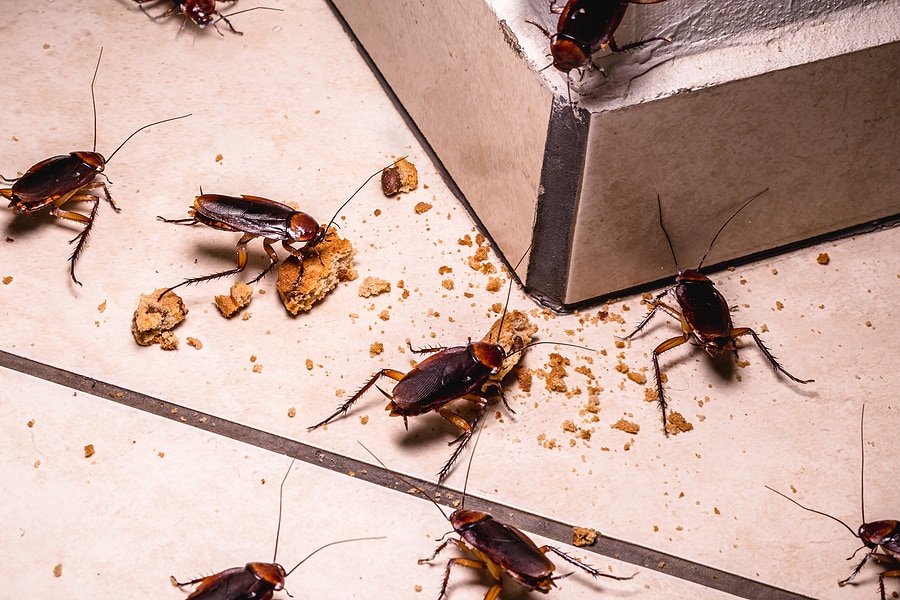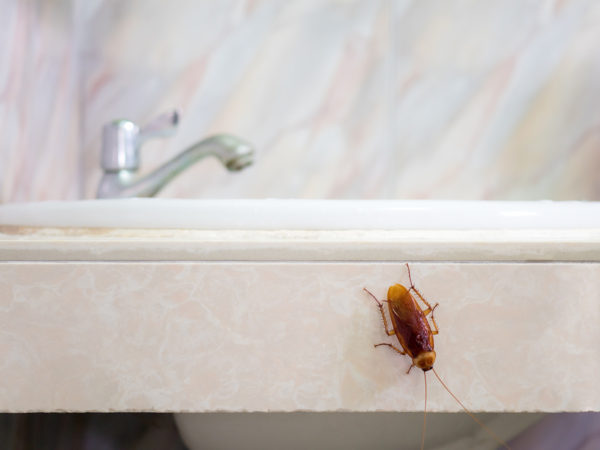READY TO GET STARTED?
REQUEST A FREE ESTIMATE
Fill out the form below or call (888) 466-7849 for a free, no-obligation estimate.

Most people equate cockroaches with dirty homes but this isn’t always the case. What attracts cockroaches to a clean house is food, water, and warmth. While the presence of one cockroach in your home can be enough to send you into a panic, one roach doesn’t necessarily mean you have a full blown infestation. Roaches are social pests, however, and reproduce quickly. If you spot one, odds are there are a few others lurking nearby, in dark corners or cracks and crevices and they could be fast on their way to a full blown infestation.
Cockroaches are dangerous to humans – they carry bacteria on their bodies and their feet, contaminating any surfaces they come into contact with. They can also trigger allergies and asthma. Besides seeing a live bug, how do you know you could have a cockroach problem? Signs of cockroaches in your home include dead bodies; eggs or eggshells (which are small, brown and oval-shaped); droppings (which are dark and powdery like ground coffee); and a strong, musty odor that doesn’t go away.
The best method of roach control is to be proactive in preventing them. Prevent cockroaches by:
Roaches are attracted to dirt and crumbs as a source of food Make sure to always wash dishes after a meal and put them away. Clean up any crumbs and spills immediately. Take out the garbage before going to bed. Clean any grease from your stovetop. Keep food sealed in airtight containers. Sweep, mop, and vacuum on a regular basis. Don’t leave pet food, treats, and water out overnight.
Clearing out clutter gets rid of places roaches can use to hide. Keep rooms clutter free and dusted often. Use plastic storage bins with lockable lids versus cardboard boxes. Eliminate newspapers and cardboard altogether as roaches love to breed in these materials.
Roaches get into homes under doors and through cracks. Identifying these and sealing them up helps eliminate points of entry for cockroaches and other pests. Thoroughly inspect around windows and doors, along foundations and the roof, in attics and crawlspace vents, and around holes used for utility and plumbing lines. For small holes and cracks, use caulk to seal them. For larger holes, especially around pipes, use steel wool and foam to seal. Fine mesh wire can be used to seal around attic vents and chimneys.
Roaches, like most pests, need water and moisture to survive. Therefore, standing water or excessive moisture can attract roaches to your home. Regularly inspect your plumbing for leaks and repair them immediately. Make sure to check faucets, sinks, refrigerators, and appliances for leaks and excessive moisture. Crawlspaces are also a common source of excess moisture in homes. Consider crawlspace enclosure to help minimize moisture under your home.
A cockroach infestation can be extremely difficult to control. Prevention can only go so far in the battle against roaches. If you suspect you have a problem with cockroaches, contact a professional pest control company who can help identify the type of roach you have, thoroughly inspect your home to identify points of entry or food sources, and help set you up with a comprehensive roach control treatment and prevention plan.

Take out the trash regularly; keep your house spotless; store your food in airtight containers: these are just a few of the things you can do to prevent pests from coming into your home. So what attracts cockroaches to a clean house? Cockroaches are extremely versatile pests. They have a very wide-ranging diet and will eat just about anything you can imagine. They have highly tuned water-finding senses and are experts at hiding. All of these adaptations allow them to survive in just about any environment. Roaches also pose health concerns to humans. They are known to carry diseases and can trigger allergies and asthma. They are also extremely hard to get rid of once you have cockroaches in the house. But how do cockroaches get in your clean house?
Some areas are more prone to cockroaches than others. The southeastern United States, especially Georgia, Florida, and Alabama, are home to a large population of American cockroaches (also known as palmetto bugs). If you live in these areas you can expect to see these pests in your home despite cleaning on a regular basis. Unlike German cockroaches, American cockroaches aren’t associated with unsanitary conditions. They may enter your home through a gap in a window seal or through a door that is left open for a prolonged period of time.
Roaches come into your home in search of three things: food, shelter, and water. They have also developed the ability to use even the smallest of openings as an entryway into your house. They can come in through cracks in the exterior walls, dryer vents, or even the gaps between walls and floors. Perform a thorough evaluation of the exterior of your home and seal any entry points you find.
Roaches need moisture to survive and this search for water will bring them into even the cleanest of homes. Leaky pipes and faucets are one of the most common attractants for cockroaches and is one of the main reasons you often see them in bathrooms, kitchens, and laundry rooms. They will also hide out under refrigerators and air conditioning units to indulge in their condensation, and even drink from pets’ water bowls when left out overnight. Roaches love places that are dark and undisturbed so you can often find them in basements, in the dark corners of cabinets, and underneath large appliances, especially those that use water.
Roaches will seek out food sources wherever they can find them. Despite your best efforts to keep your kitchen spotless, these resilient pests will make do with just about anything to eat. In fact, they have been known to feast on cardboard, wallpaper paste, book bindings, grease, leather, soap, and even human hair. They can often be found hiding out in stacks of cardboard in your attic and garage, books that you’ve stored away for extended periods of time, and even behind pictures that have been hanging on the walls.
While these areas may not be in need of repair or even in plain sight, they can attract roaches and need to be addressed to prevent roach infestations. Roaches have been known to hide out in the spaces between outside doors and floors. They can get into your home through window screens that aren’t flush with the frame or that have rips or tears in them. They can also get in around air conditioning units that don’t fit properly in windows, and into trash cans that aren’t cleaned regularly, even the ones in your bathrooms.
Roaches will come into your yard in search of the same things as your home: food, shelter, and water. You can harbor as many roaches in your yard as you do in your home. Any standing water in places like bird baths, flower pots, and gutters will attract cockroaches. Compost and wood piles provide food and shelter. Trash and recycling bins provide an excellent food source. Leaf litter, dense vegetation, and mulch or pine straw provides ideal hiding places.
Roaches are versatile pests that are extremely hard to get rid of once they get into your home. There are some roach prevention steps you can take to help keep them from invading your house:
It can be frustrating to work hard at keeping your house clean and still have issues with roaches. If you have a roach problem or if you want to get a prevention program started before they become a problem, call a professional pest control company who can provide you with a customized pest control program using only the most innovative and advanced pest products and equipment available. Give us a call or request a free estimate to get started.
How Much Does A Termite Inspection Cost?
German Roaches vs American Roaches: What’s The Difference?
Where Are All of These Roaches Coming From?
Is Your Hotel on the Bed Bug Registry?
Winter Lawn Care: Is Your Grass Prepared For Spring?